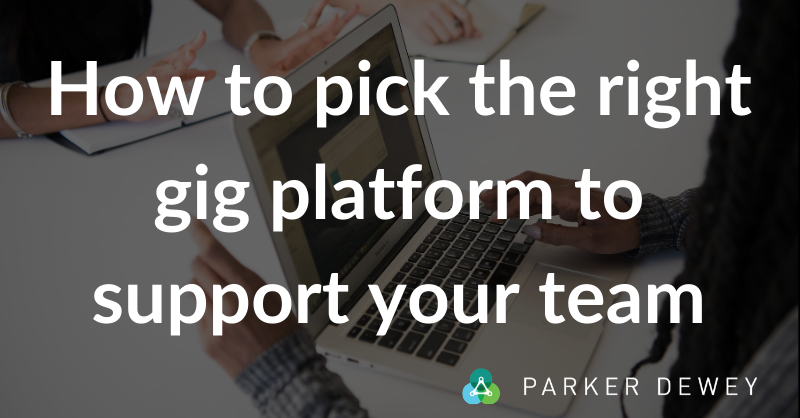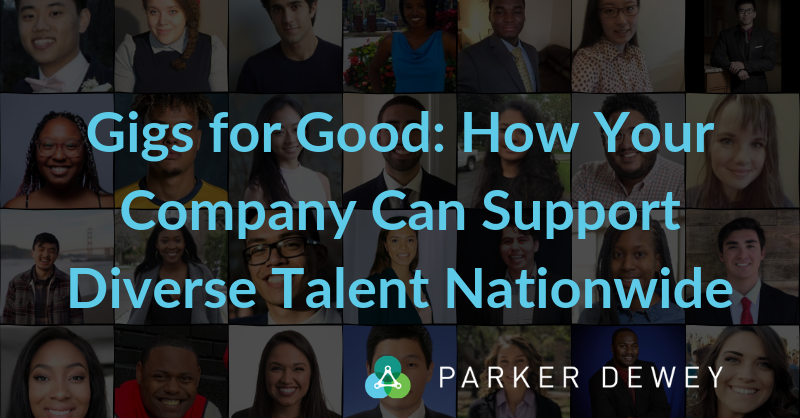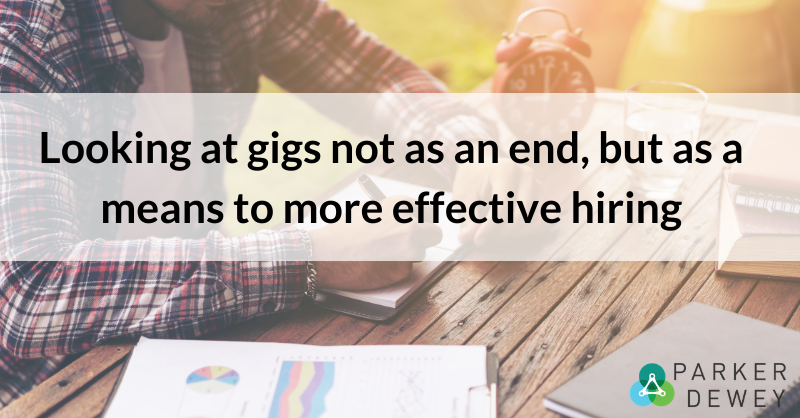
Selecting a Gig Platform at Your Company? Be Sure to Consider These 3 Things
It’s officially 2020, and like it or not, the gig economy is now a legitimate force in global business. Having progressed beyond the commodity-based gigs like Uber and Taskrabbit, the gig economy now includes significant number of professional, white collar roles (and not just techies either). In fact, in 2019 the majority of professional freelancers were actually creatives, not programmers.
If you’re a full-time employee, this may not necessarily be on your radar (or be that important to you). But I assure you, if you or your team hasn’t already leveraged a gig worker or two in the past, it is very likely on the horizon for the future.
That’s right, with significant numbers of Fortune 500s using gig workers (not to mention all the employees that hire freelancers on their company cards without reporting it up the chain), it’s becoming ever more important for companies to understand how to effectively leverage the gig economy.
With platforms surfacing by the day, choosing which platform to use is often the first hurdle to overcome. That’s why it’s important to understand these 3 things when making your selection:
- Talent Profile
- Legal Implications
- Fees
Talent Profile
There are 100+ (and growing) gig platforms in existence. While some have catered to the masses, the trend of targeting niche talent groups appears to be gaining traction. That said, when considering a platform, you must take into consideration the type of talent you need for the projects you have in mind. Here are some examples:
- Perpetual Giggers - Upwork and Fiverr tend to attract gig workers that are freelancing as a career. While this isn’t always true, these workers tend not to be seeking full-time roles through gigging with companies (and their platform policies make it so that it would cost companies a pretty penny to convert from gigger to employee anyway).
- Expert Talent - When 20% of gig economy participants are 55+, there’s clearly a lot of talented, highly experienced gig workers out there. And it makes sense: gig work is a great way to semi-retire while retaining control over your schedule and projects. Because of this, a variety of expert talent platforms have surfaced (i.e. BTG, Catalent) that focus on matching experienced workers to longer term contracts.
- Pathways - While progressively becoming an accepted career choice itself, gig work can also act as a pathway to a full-time role and some gig platforms are catering to just that. Mom Project emerged as an effort to help moms re-enter the workforce at their own pace, while Parker Dewey helps college students and recent grads use gig work to build their resumes and connect with employers to boost their chances of receiving full-time offers.
Legal Implications
In addition to the talent you’re seeking, it’s important to consider how your potential gig platform of choice is structured from a legal perspective. Here are some questions to consider as you’re thinking things through:
- Liability
- Who takes liability? The platform, the gig worker, or the employer?
- Who mediates in the event of a dispute?
- Confidentiality
- Are there NDAs?
- Who owns the work product?
- What happens as a result of an NDA breach?
- Background Checks
- Does the platform conduct background checks?
- Will your company conduct background checks prior to engaging the consultant if the platform doesn’t?
- Are background checks required for the type of project your freelancer will be completing?
- Worker Classification
- Who is the employer of record?
- Are the gig workers 1099s of your company or the gig platform?
- And if you’re in CA: what rules must I follow to be sure I’m in compliance with California Law AB5?
Of course, if you’re unsure of the implications for your company, it’s worth it to speak with Legal or Procurement.
Fees
In addition to considering how your platform of choice is structured, potential costs also play a significant role in choosing to move forward with hiring giggers. Here are some questions to ask so you can understand the fee structures of potential platforms and how they align to your budget:
- Membership and Sign Up Fees
- Some platforms have no membership fees, others have monthly options, while others have one time only fees.
- If you intend to use gig workers continuously, these are likely worth the price. Whereas if it’s a one-off project, it might not.
- Processing Fees
- These tend to range between 2%-10% of the project costs.
- Transaction or Account Withdrawal Fees
- These are often 1-2% and can be applied to the employer, the freelancer, or both.
- Conversion Fees
- For those hoping to use gig platforms as a hiring solution, it’s important to determine what the conversion fee (or temp-to-perm) might be.
- Sometimes these costs can be up to 20% of a converted gig worker’s first year salary.
- These fees are generally instituted to discourage full-time hiring and keep the relationship on the platform.
- Fees Paid by Gig Workers
- Fees paid by gig workers are anywhere from 0%-20%.
- Keep in mind that platforms with high gig worker fees could affect the work quality given your budget (i.e. when 20% is going to the platform, the freelancer’s take-home is lower, and they’re likely factoring that into their initial pricing offering.)
Here at Parker Dewey, we’re leveraging the gig economy to bridge the college-to-career gap. Our Micro-Internship platform helps employees get work off their plates while simultaneously auditioning great potential entry-level hires.
As one of the gig platforms your company may consider, here’s how we stack up to the rest:
Talent Profile
Our network is made up entirely of current college students and recent graduates (1-3 years out of college) from U.S. based institutions. With access to 11 million degree earners, 80% of Career Launchers selected come from underrepresented backgrounds (i.e. first gen, HBCUs, HSIs, women, LGBTQ+), and all majors are represented.
Legal Implications
- Liability - We take all liability and mediate too.
- Confidentiality - Our freelancers (we call them Career Launchers) sign strict NDAs and employers own all the work product.
- Background Checks - Given the length of our Micro-Internships (10-40 hours), we do not conduct background checks. Most projects on the platform leverage public information alleviating the need for a background check, and our NDAs are in place to prevent any negative outcomes with regard to confidentiality.
- Worker Classification - Parker Dewey is structured as a consulting firm. That means all Career Launchers come through us as 1099s and we are the employer of record. That frees your team from having to complete any onboarding HR paperwork so you can focus on the important stuff: getting quality deliverables from our network of highly motivated college student and recent grad freelancers.
Fees
- Membership and Sign Up Fees - NONE
- Processing Fees - INCLUDED (90% of project cost goes directly to Career Launcher)
- Transaction or Account Withdrawal Fees - NONE
- Conversion Fees - NONE
- Fees Paid by Gig Workers - NONE
Because Parker Dewey is mission-driven, we charge no fees whatsoever other than a 10% processing fee. Our gig workers (we call them Career Launchers) pay nothing either, since part of our diversity, equity, and inclusion philosophy is that all work should be paid. Finally, we charge no temp-to-perm because we want to facilitate great, long-lasting professional connections between our Career Launchers and employer partners.
Ready to leverage gigs at your company, but not sure how to start?
Sign up to receive our free Freelance Program Checklist for a full list of considerations to address when launching a program at your organization.





